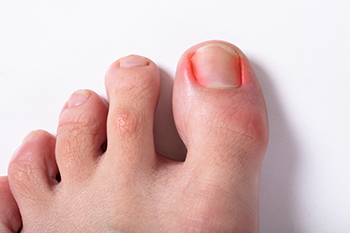
Young runners often face nail issues like inconsistent thickness or ingrown toenails due to repetitive pressure and friction from training. Running, especially over long distances, places stress on the toes as they repeatedly hit the front of the shoe. This pressure can cause nails to thicken unevenly, making them brittle or prone to splitting. Ingrown toenails, where the nail grows into the surrounding skin, often result from wearing tight or poorly fitted shoes or improper trimming techniques. These conditions can lead to pain, swelling, or infection, impacting performance and comfort. Maintaining consistent nail care, such as trimming straight across and ensuring proper shoe fit, helps prevent these problems. If you are a young runner experiencing persistent toenail pain or ingrown toenails, it is suggested that you schedule an appointment with a podiatrist for individualized treatment.
Ingrown toenails can become painful if they are not treated properly. For more information about ingrown toenails, contact Gary Saphire, DPM of Parkway Podiatry. Our doctor can provide the care you need to keep you pain-free and on your feet.
Ingrown Toenails
Ingrown toenails occur when a toenail grows sideways into the bed of the nail, causing pain, swelling, and possibly infection.
Causes
- Bacterial infections
- Improper nail cutting such as cutting it too short or not straight across
- Trauma to the toe, such as stubbing, which causes the nail to grow back irregularly
- Ill-fitting shoes that bunch the toes too close together
- Genetic predisposition
Prevention
Because ingrown toenails are not something found outside of shoe-wearing cultures, going barefoot as often as possible will decrease the likeliness of developing ingrown toenails. Wearing proper fitting shoes and using proper cutting techniques will also help decrease your risk of developing ingrown toenails.
Treatment
Ingrown toenails are a very treatable foot condition. In minor cases, soaking the affected area in salt or antibacterial soaps will not only help with the ingrown nail itself, but also help prevent any infections from occurring. In more severe cases, surgery is an option. In either case, speaking to your podiatrist about this condition will help you get a better understanding of specific treatment options that are right for you.
If you have any questions please feel free to contact our office located in Brooklyn, NY . We offer the newest diagnostic and treatment technologies for all your foot and ankle needs.



